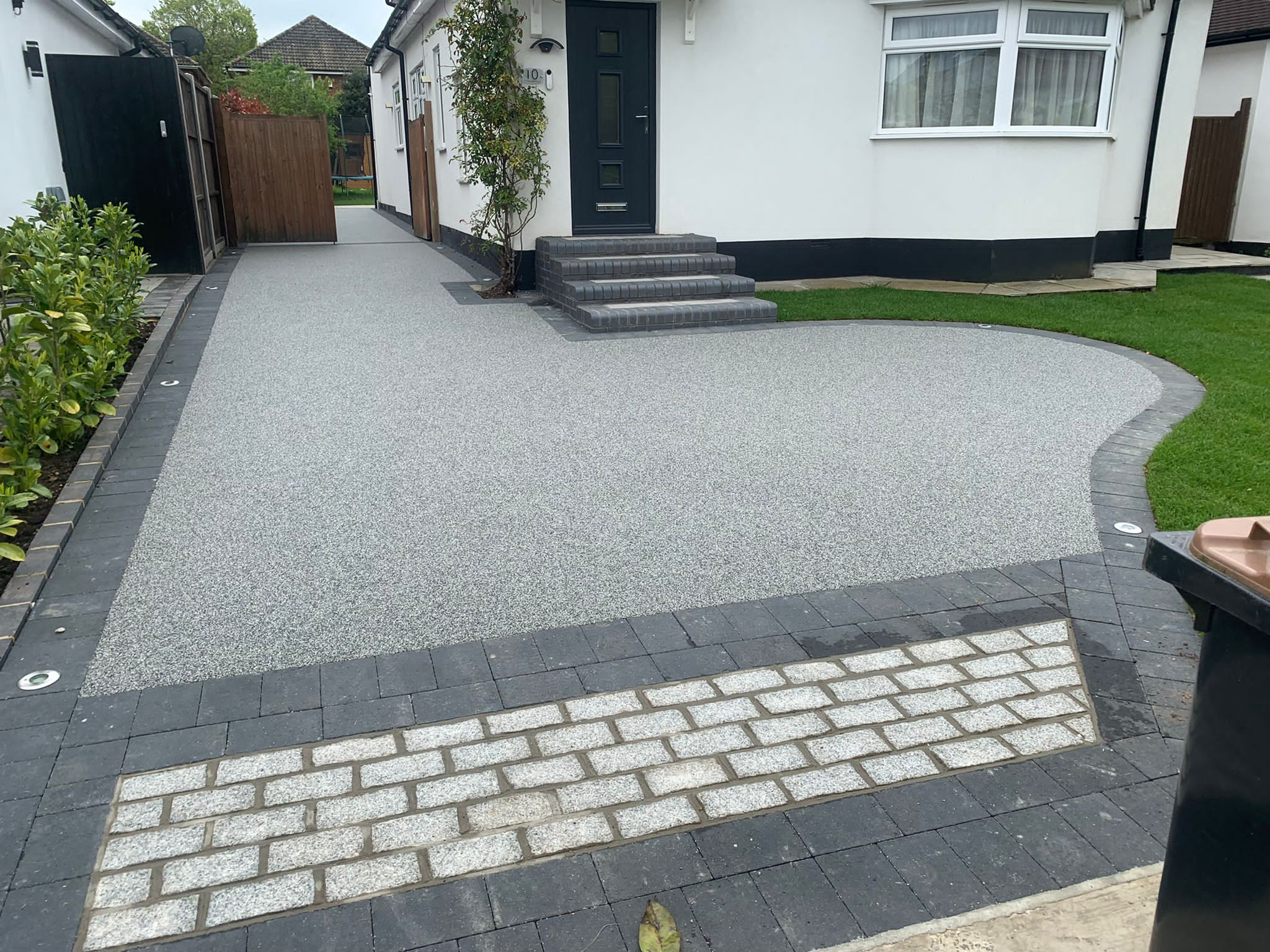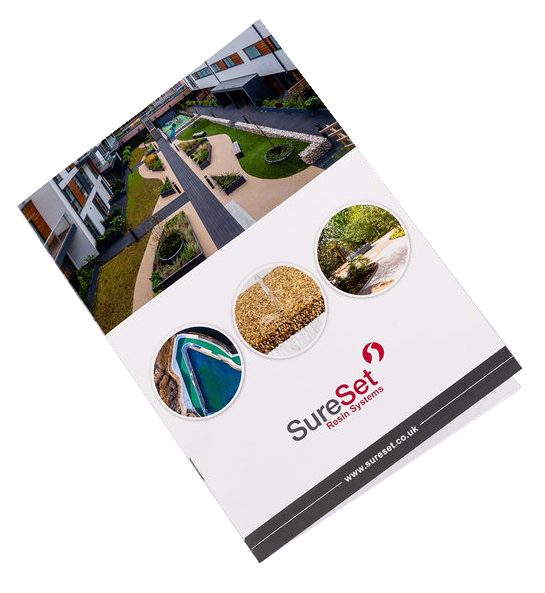
Top tips for choosing a resin bound paving company
How do I choose a resin bound installer?
Having noticed a complete lack of advice on how to choose a reputable resin bound company, using our extensive knowledge of the resin bound industry, we decided to write an unbiased Blog to help you out. If, after reading you have any other questions, please feel free to ask - we hope you find this useful...
Just a few years ago we knew little about asphalt (Tarmac) paving, with many of us suffering at the hands of unscrupulous traders knocking on doors with ‘left over’ asphalt from nearby jobs. We were unaware of what surface it could be laid on, how the surface should be prepared and how it should be installed.
The good news is that we are now much more educated about asphalt. The bad news is that we are, in some ways, in the same situation with resin bound paving.
Resin bound paving is a premium product that when installed correctly will last you for up to 25 years.
As resin bound becomes more popular the number of companies providing it is growing. As it is a relatively new product, it’s one of only a few trades within the construction industry without a governing body or trade association of its own; and, apart from the Paving Expert website, there isn’t anywhere to go for independent advice about resin bound paving.
Anyone considering a resin bound driveway (or footpath, patio etc.) wants the process of choosing and installing it to be as straightforward and stress free as possible. It therefore pays to do some research to ensure that we get the ‘right’ material from a reputable installer who can demonstrate a track record of successfully providing solutions and good service for its customers.
Although we have been established for nearly 22 years and operate as a commercial business, we still retain a passion for what we do. So with no sales pitch, we have put together these Top Tips for choosing a resin bound paving company to help you.
Some questions we suggest you ask any resin bound company
Can you view other installations/get references? Any company confident of their work will readily provide references from customers and make arrangements for you to view an installation in situ if you so wish.
Do they offer a guarantee? Even in the best run organisations things can go wrong. So a well-established company offering a substantial guarantee, that doesn’t diminish over time, will provide reassurance, and cover you against:
- Loose stone
- Cracking
- Oil damage
- UV degradation
- Colour change
- Frost damage
- Workmanship
Do they belong to any affiliate organisations or adhere to national standards? Look for companies who are members of organisations such as the Guild of Master Craftsmen or Federation of Master Builders and are achieving and maintaining national standards, such as ISO 9001 (a quality management system) and Investors in People.
What should it cost? On average, between £40 and £80 per square metre, dependent on depth, size of area and the type of aggregate you choose.
We recommend you get at least three quotes. But before comparing, check the specification* is the same (i.e. comparing like for like) and whether VAT is included.
Remember: the cost will also be influenced by the quality of the components within the product, so please don’t purchase purely on price, but on quality too.
*Different applications require different depths dependent on its end use. If one company is quoting for 20mm depth, and the other 16mm, ask why.
Do they provide samples? Requesting samples should be an easy to find option on their website. Contact them if you can’t find what you are looking for, or you are unsure what is the most suitable for your project.
Please be wary of companies who aren’t willing to send out samples, or charge for them.
Do they install other products? A company specialising in one particular product will be an expert in that area because the whole company, from research and development to installation, is focussed on one product.
Do they cover the whole of the UK? You do not want an installer who has to travel a long distance and is tired and rushed working for you. Check that the installer is based locally or the company engages trained installers through a well-managed installer scheme to do the work for them.
Do they offer technical advice? Free advice on suitable bases, slip resistance, permeability, suitable depths and blends and specification sheets should be readily available.
What weather conditions do they install in? Resin bound paving should be installed in dry conditions with a minimum temperature of 0° and rising. Installation should take place in a window allowing at least four hours of dry weather.
Preparation and suitable bases The surface should be dry and clear of loose material or dust. All areas adjacent to the site of installation should be protected to minimise the risk of resin contamination. Resin bound paving can be laid over both new and existing surfaces including:
- Grid structures - laid directly onto compacted stone and in-filled with gravel
- Crushed rock – suitable for areas of low pedestrian traffic with no vehicular access
- Asphalt – laid directly onto structurally sound and crack free existing asphalt or newly installed asphalt once it has cooled
- Concrete – laid onto structurally sound and crack free existing concrete that has been thoroughly cleaned and primed. A minimum of seven days is recommended before installing onto new concrete.
Do they offer maintenance guides and after installation support? Check if maintenance guides and technical support is provided post installation. Any company committed to customer service will also provide you with an opportunity to feedback on your experience so that they can learn from it.
Do they provide edging? Resin bound paving should always be laid up against a stable edge. This can be brick, timber, lawns, walls etc. where there is none, metal edging can be installed. The edging strip will need about an hour to bond sufficiently before installing resin bound paving; you can check this by applying firm hand pressure, which the edging should resist.
To summarise, here is an easy reference of Do’s and Don’ts when it comes to choosing a resin bound paving company:
Do:
- Use recommendations; if you see an installation that appears to be quality, ask for details of the installer.
- Your research.
- Look for membership of recognised bodies; such as the Federation of Master Builders or Guild of Master Craftsmen and quality management systems such as ISO 9001.
- Try and view previous installations.
- Get details in writing.
- Use companies who only have a mobile phone number, no address or those who cold-call.
- Pay for a quote or general advice; most reputable firms will not charge you.
- Be afraid to ask questions; before, during and after installation.
- Pay a deposit after the first visit.
- Feel pressured into making a decision before you are ready.
- Use a company willing to lay on an unstable or damaged base.
- Be misled by huge discounts offered on an inflated original price.
Now sit back and enjoy your low maintenance resin bound surface!
Enquire








